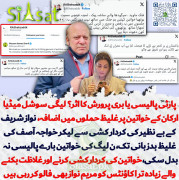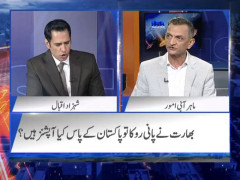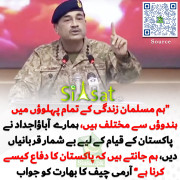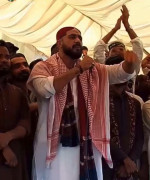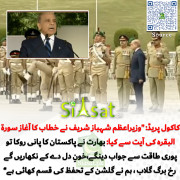Tawassul and Waseelah literally means to make a request or supplicate through a means. It is permissible for one to request Allah Taala to accept his duaa through the medium of some deeds or the rank of certain individuals as this may be closer to acceptance.
There are various forms of Tawassul and Waseela:
1. To make Tawassul to Almighty Allah that He accepts the Duaa due to one having performed a certain good deed is permissible and unanimously accepted. It is supported by the Hadith of Sahih Bukhari in which three people were trapped in a cave. Each of them made Duaa to Allah Taala to move the obstructing rock and they requested Allah Taala to accept their duaas due to some good deed that each of them had done.
2. To make Tawassul with the names and attributes of Almighty Allah: This is also permissible and is supported by the following verse, And Allah has beautiful names, so call unto Him through them. (Surah Aaraaf v.180). Example: If someone says, Oh Allah, I ask you through your attributes and beautiful names to grant my specific wish.
3. To make Tawassul to Allah Taala through the rank and position of certain individuals, alive or deceased, in the sight of Almighty Allah This includes the Prophets [alayhimus salaam], the martyrs and any other pious servant of Allah. Example: If one says, Oh Allah, I beseech you to accept my duaa due to the status of Rasulullah [Sallallaahu Alayhi Wasallam] in Your eyes. This form of Tawassul is also permissible according to the vast majority of the Ulama (scholars) and it has in fact remained part of their practise.
4. Some scholars even mention a fourth type of Tawassul, where a person requests some living pious servant of Allah to make duaa for him: This is also unanimously accepted.
The only type of Tawassul that is disputed is number3, where one makes Tawassul through individuals that are alive or deceased by saying, O Allah, I besech you to accept my Duaa due to the status that Rasulullah [Sallallaahu Alayhi Wasallam] (or some other pious person) hold in Your eyes. The first opposition against this form of Tawassul was in the 7th century of Islam. (shifaa-u-siqaam)
There are numerous proofs that support the permissibility of Tawassul through individuals. The following are some substantiations:
1. Sayyiduna Uthmaan ibn Hunayf [radhiallaahu anhu] narrates that once a blind person came to Rasulullah [sallallaahu alayhi wasallam] and said, Oh Rasulullah [sallallaahu alayhi wasallam]! Ask Allah to cure me. Rasulullah [sallallaahu alayhi wasallam] replied, If you wish I will make Duaa or else you may be patient and this is better for you. The man said, Make Duaa instead, Rasulullah [sallallaahu alayhi wasallam] then commanded him to make Wudhu properly and that he recites the following Duaa, Oh Allah, verily, I ask of you and I turn to you through your prophet, the prophet of mercy, O Muhammad [sallallaahu alayhi wasallam], verily, I have turned to my Lord through you so that my need be fulfilled. Oh Allah, accept his intercession on my behalf. (Musnad Ahmad vol.4 pg.138; Sunan Tirmidhi; Sunan ibn Majah; Mustadrak Haakim and others). Imaams Tirmidhi, ibn Khuzaymah and Haakim have classified this Hadith as authentic. The words, I turn to you through your prophet clearly proves Tawassul through the position of a person. Rasulullah [sallallaahu alayhi wasallam] also told him that he should make the same supplication whenever he needed to. (al-Raddul Muhkamul Mateen pg.145)
2. Sayyiduna Uthmaan ibn Hunayf [radhiallaahu anhu] taught this duaa to someone after the demise of Rasulullah [sallallaahu alayhi wasallam]. That persons need was also fulfilled.
Abu Umaamah ibn Sahl ibn Hunayf [radhiallaahu anhu] reports that a person requested Sayyiduna Uthmaan ibn Affaan [radhiallaahu anhu] to fulfil his need. Sayyiduna Uthmaan [radhiallaahu anhu] did not attend to him. The person complained to Sayyiduna Uthmaan ibn Hunayf [radhiallaahu anhu] about his plight. Sayyiduna Uthmaan ibn Hunayf [radhiallaahu anhu] told him to make Wudhu, go to the Musjid, offer 2 Rakaats of Salaat and recite the following Duaa: O Allah, verily I ask you and I turn to you through our prophet, the prophet of mercy (Rasulullah sallallaahu alayhi wasallam). O Muhammad! Verily, I have turned to our Lord through you so that He may fulfil my need.
The person then went to Sayyiduna Uthmaan ibn Affaan [radhiallahu anhu] who then [radhiallaahu anhu] immediately fulfilled his need and told him to return whenever he had any need in the future. (al-Mujamus sagheer vol.1 pg.184; al-Mujamul Kabeer vol.9 pg.17; Dalaailun-nubuwwah of Imaam Bayhaqi vol.6 pg.167-168)
Imaam Tabrani has mentioned that this Hadith is authentic. (al-Mujamus sagheer vol.1 pg.184). Allamah Mahmood Zaahid Al- Kawthari has also classified the chains of Baihaqi to be Saheeh (authentic). (Maqaalatul-Kawthari pg.391). For a detailed analysis refer to al-Raddul Muhkamul Mateen of Shaykh Abdullah Siddique al-Ghumarie pgs.141-157; Raful Manaarah of Shaykh Mahmood Saeed Mamdooh pgs.125-131
3. Sayyiduna Anas ibn Maalik [radhiallaahu anhu] reports that when the mother of Sayyiduna Ali [radhiallahu anhu] passed away (Faatima bint Asad radhiallaahu anha], Rasulullah [sallallaahu alayhi wasallam] made the following Duaa before burying her: O Allah, The One who gives life and death, and Who is living and will never die, forgive my mother Faatima bint Asad [radhiallaahu anha], and make her arguments known to her, i.e. make the answering of Munkar and Nakeer easy, and make her grave spacious for her. (I ask you) through the right of your prophet and all the prophets before me, for verily You are Most Merciful. (al-Mujamul awsat vol.1 pg.152; Hilya vol.3 pg.121)
Bi haqqi nabiyyika (through the right of your prophet). This narration is classified as authentic according to the standards of Imaam ibn Hibbaan and Haakim. (Raful Manaarah pg.147; Maqaalaatul Kawthari). Haafiz Ibn Hajar Al-Haytami(RA) that its chain of narrators is good.(Refer to his footnotes on Al-Manaasik of Imaam Nawawi(RA) pg.500)
4. When a person leaves the Musjid, the following duaa is recorded, Allaahumma inniy as-aluka bi haqqis-saa-ileena alayka, wa bi haqqi mamshaaya haaza. (Translation: Oh Allah, I ask you through the right of those who ask you and through the right of the act of my walking)
In this narration, Tawassul through people is established, through the right of those who ask and Tawassul through ones deeds is supported by the second part. This Hadith is recorded in Sunan ibn Maajah, Musnad Ahmad (vol.3 pg.21), Musannaf ibn Abi Shaybah and others. The following Muhadditheen have regarded it as authentic: Imaam ibn Khuzaymah (Kitaab Tawheed pg.17), Hafiz Abdul-Ghani al-Maqdisi (al-Naseehah), Hafiz Abul-Hasan al-Maqdisi teacher of Allaamah Munzhiri (refer al-Targheeb vol.3 pg.273), Allamah al-Iraqi Ustaadh of Hafiz ibn Hajar (Takhrijul Ihyaa), Hafiz ibn Hajar al-Asqalaani (Nataa-ijul Afkaar vol.1 pg.272), Hafiz Dimyati (Al-Matjarur-raabih). These are six great Muhadditheen that have accepted this Hadith to be authentic, hence, there remains no doubt at all concerning its acceptability.
The following two proofs illustrate to us the practise of the Sahaaba [radhiallaahu anhum] as well:
5. Sayyiduna Maalik al-Daar, the treasurer of food during the time of Sayyiduna Umar ibn al-Khattaab [radhiallaahu anhu], reports that once the people had been experiencing a drought in the era of Sayyiduna Umar [radhiallaahu anhu], a man went to the grave of Rasulullah [sallallaahu alayhi wasallam] and said, O Rasulullah [sallallaahu alayhi wasallam], ask for rain on behalf of your Ummah, for verily, they are being destroyed. Thereafter this person was instructed in a dream to go to Sayyiduna Umar [radhiallaahu anhu] and tell him that, the rains will soon come and say to him, Be intelligent, When Umar [radhiallaahu anhu] was informed of this, he began to cry and he said, O My Lord, I will only leave out what I am unable to do. (Musannaf ibn Abi Shaybah vol.12 pg.31-32; Dalaailun-nubuwwah of Imaam Bayhaqi vol.7 pg.47). Hafiz ibn Katheer [ra] has stated that the chain of narrators is good and strong (Musnadul Faarooq vol.1 pg.223). Hafiz ibn Hajar has also indicated to its authenticity in Fathul Bari.
6. Abul-Jawzaa Aws ibn Abdullah [radhiallaahu anhu] reports that once, the people of Madinah were experiencing a severe drought. They complained to Sayyidatuna Aaisha [radhiallahu anha]. She advised them that they should make a hole in the tomb of the roof of Rasulullah [sallallaahu alayhi wasallam] so that the grave is exposed to the skies. He says, When they made a hole, heavy rains came down and crops also began to grow. (Sunan Darimi vol.1 pg.56)
7. Imaam Haakim and others have narrated on the authority of Sayyiduna Umar ibn al-Khattaab [radhiallaahu anhu] that Rasulullah [Sallallahu alayhi wasallam] said, When Adam [alayhis salaam] ate from the forbidden tree, he said, O My Lord, I ask you through the right of Muhammad [sallallaahu alayhi wasallam] that you forgive me. The words used were, Bi haqqi Muhammad Allah Taala accepted Aadams [alayhis salaam] repentance. (al-Mustadrak vol.2 pg.615; Dalaailun-Nubuwwah of Imaam Bayhaqi vol.5 pg.489; al-Mujamus saghir of Imaam Tabrani vol.2 pg.82)
The status of this narration has been extensively disputed by the various Muhadditheen. Some have accepted it to be authentic and others rejected it. However, there is another narration that supports this narration recorded by Imaam Abul-Hasan ibn Bishraan [ra] on the authority of Sayyidatuna Maysarah [radhiallaahu anha]. The chain of narrators for this Hadith is totally different from the previous one. And in fact, Hafiz ibn Hajar [ra] has stated concerning a completely different narration which has the very same chain of narrators, that this chain of narrators is strong. (al-Raddul Muhkamul Mateen pgs.138-139; al-Ahaadeethul Muntaqaa pg.14, both of Shaykh Abdullah Siddique al-Ghumarie). These narrations have all proven beyond a shadow of doubt that this form of Tawassul is permissible and was widely practised as well.
Hereunder follows a list of some of the many illustrious Ulama of the past who had practised upon Tawassul through the rank of the pious, deceased or alive:
1. Imaam Hasan ibn Ibrahim al-Hallal [ra] has stated that whenever he had any urgent need, he would go to the grave of Imaam Moosa ibn Jafar [ra] and make Tawassul through him. Allah Taala would fulfil his need. (refer Taarikh Baghdaad)
2. Imaam Shaafiee [ra] would make Tawassul at the grave of Imaam Abu Hanifa [ra]. (Taarikh Baghdaad). Allaamah al-Kawthari has classified this incident as authentic. (Maqaalaatul Kawthari pg.381)
3. Allaamah Taajuddeen al-Subki [ra] has mentioned that the people would go to the grave of Imaam ibn Foorak(ra), the teacher of Imaam Bayhaqi [ra] and make Duaa and their Duaas would get accepted.
4. Hafiz Al-Zarkashi [ra] has made Tawassul in the introduction to his commentary to Sahih al-Bukhari entitled, al-Tanqeeh.
5. Hafiz Taqi-u-ddin al-Subki [ra], the father of Taajuddin al-Subki [ra], has approved of this firm of Tawassul and he has written a detailed treatise on this topic. (See his book: Shifaa-u-Siqaam pgs.293-318)
6. Allamah Nawawi [ra] has mentioned that from among the etiquettes of visiting the grave of Rasulullah [sallallaahu alayhi wasallam] one should make Tawassul through Rasulullah [sallallaahu alayhi wasallam] to Allah Taala to accept his Duaas. Thereafter, Allamah Nawawi states, and one of the best things that one should do is what has been related by Allaamah al-Mawardi [ra], al-Qaadhi Abu Teeb [ra] and all our Ulama and they have all regarded it as commendable, and that is the incident of Imaam al-Utabi [ra] that he said, I was once seated by the grave of Rasulullah [sallallaahu alayhi wasallam], when a Bedouin came and said, Peace be upon you, oh, Messenger of Allah. O Messenger of Allah, I have heard Almighty Allah say in the Quraan And if they, when they had been unjust to themselves, had come to you (Muhammad Sallallahu alayhi wasallam) and begged Allahs forgiveness and the messenger had begged forgiveness for them, indeed they would have found Allah All-Forgiving. Most merciful.(Al-Nisaa:64) hence, I have come to you in a state that I seek forgiveness of my sins by seeking your intercession by my Lord, thereafter he recited a few couplets and departed. Imaam al-Utabi [ra] states, I then fell asleep and I saw Rasulullah [sallallahu alayhi wasallam] instructing me by the words, O Utabi, go to that Bedouin and give him the glad tidings that Almighty Allah has forgiven him. (Refer al-Majmoo vol.8 pg.456 Cairo and Manaasikul-Imaam-Al-Nawawi pg.498-499 Maktabah Salafia). This incident has been related by many Ulama in their respective compilations. Some of them are: Haafiz Ibn-Katheer in his Tafseer, Allamah Abu-Muhammad ibn Qudaamah in Al-Mughni vol.3 pg.556, Imaam Abul-Faraj in Al-Sharhul-Kabeervol.3 pg.495, etc.)
7. Imaam Ahmad bin Hambal(RA) has also encouraged making Tawassul through Rasulullah [sallallahu alayhi wasallam] in ones duas. (Fataawa ibn Taimiyyah vol.1 pg.140, Also see Mafaaheem pg.137)
8. Haafiz Shamsud-Deen Al-Sakhawi (RA), the grand student of Haafiz ibn Hajr Al-Asqalaani(RA) made Tawassul on many occasions through Rasulullah [Sallallahu Alayhi Wasallam] in his books, see for example Al-Tuhfatul-Lateefah vol.1 pg.3, 17; al-Ibtihaaj bi azkaaril musaafiril haaj
9. Allamah Muhammad ibn-ul-Jazri(RA) the famous Muhaddith and Master of Qiraaat has mentioned that from amongst the Aadaab etiquettes of dua is that one makes Tawassul with the Ambiyaa and the pious ones.(Al-Hisnul Haseen)
10. Imaam Al-Shawkaani Al-Salafi(RA) has also permitted Tawassul. (Tuhfatu-Zaakireen pg.50)
These are ten Different types of Ulama (i.e. some are Fuqahaa, some Muhadditheen and some are Qurraa). All have either practised on Tawassul or at least permitted it. And the list could go on.(refer to Maqaalatul Kawthari pg.378-397). After contemplating on all that was mentioned above, any person with sound intelligence would believe without a shadow of doubt in the permissibility of this form of Tawassul.
More so when one realizes that this remained the practise of the Ummah for centuries. Allamah Taqee-ud-Deen Al-Subki(RA) and other Muhadditheen have stated that Haafiz Ibn-Taimiyyah(RA) who passed away in the year 728 Hijri - was the first to refute the permissibility of this form of Tawassul (Shifaa-us-Siqaam pg.293) In fact, Abu-Abdillah Al-Tilmisani Al-Maaliki(RA) (a renown scholar of the 7th century) has written a book concerning how this remained the practise of the entire Ummah since its existence. (Refer Maqaalatul Kawthari pg.397)
Lastly, we would like to draw your attention to the fact that the above permissibility is in regard to one who asks Allah Taala for a particular need and in doing so, he uses some honourable personality as his Waseela (means) without thinking or believing that the person is being supplicated to or that he will fulfil his need. Yes, if one asks directly from the deceased and he believes that the Anbiyaa [alayhimus salaam] and the pious [rahimahumullah] independently possess the power to provide, then this would be Shirk (polytheism) because he is now ascribing partners to Allah in the quality of Providing.
Many contemporaries have mixed both these forms up; a) asking directly from the deceased and, b) asking Allah Alone, through the medium of some deceased) and have passed one ruling of Shirk for both forms. This is clearly a gross oversight on their path.
And Allah Ta'ala Knows Best

